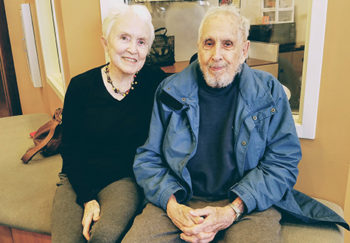
Ah, the holidays. They can be a great reason to travel home and see family. For the adult children of aging parents, though, those trips can carry extra stress: a chance to see how Mom and Dad are doing at home.
- Are they still getting around okay?
- Are they able to keep up with the house?
- It is normal forgetfulness, or something more?
This can feel like uncharted territory, entering a new role or even switching roles with the parent.
So where do you start? Laurie Archbald-Pannone, MD, a geriatrician at UVA, offers this advice: “Don’t make assumptions about anybody’s ability to take care of themselves based on age, the number of medications they’re taking, or number of medical conditions. Age does not dictate when somebody may need help – some people do just fine taking care of themselves well into their 90s while other people may need help earlier — in their 50s or 60s. Start by observing to see how they’re doing.”
Take a Look Around
If your loved one is living on their own, how is the house looking? Does it look like they’re able to keep it up? How about the yard?
If you see, for example, that the yard is overgrown, it doesn’t necessarily mean there’s any sort of a medical problem. However, it may mean they could use extra help with yard or house work. “There can be simple solutions to lots of concerns,” Archbald-Pannone emphasizes.
Function
Watch how your loved one is navigating the house. If they’ve been told in the past to use a cane or walker, are they using it?
How about driving? If there are any concerns, maybe suggest you go for a drive so you can see how it’s going. Arthritis or problems with your neck, eyes or mental function can all make driving more difficult.
Cognition
We’re often able to recognize small changes in those we know well just through general conversation. “Most commonly when patients are diagnosed with dementia, their loved ones can think back about a year to when little signs started showing up,” Archbald-Pannone says. Noticing a small change does not necessarily mean they have dementia. Just be aware if the little changes are starting to add up to a big change.
Worrisome Signs in Aging Parents
As you look around, there are some things that could be cause for concern.
The Fridge
It’s worth asking questions if you see:
- No food in the fridge
- Lots of spoiled food in the fridge
- Food that should be in the fridge that’s been stored elsewhere
Furniture Surfing
Watch for what Archbald-Pannone refers to as “furniture surfing” – holding on to pieces of furniture as they move through the room. This could show they’re unsteady, but it can also be dangerous. A chair can easily slide out of place or tip over if someone puts their weight on the back of it as they walk by.
If your loved one seems unsteady, ask if they’ve had any falls or almost-falls. If they have, ask if they’ve mentioned them to their doctor. Even if there wasn’t a serious injury from the fall, their doctor should be aware, and there are things their doctor can do to help.
Increased Forgetfulness
“Anybody can forget where they put their keys once in a while, and certainly when it’s the holidays and there’s a lot of chaos. But if it’s becoming more than that, like not remembering grandkids’ names who they know well, or getting lost in a familiar place, it may be something to look into,” Archbald-Pannone advises.
What to Do if You’re Concerned about Your Aging Parents
“If your ‘spidey senses’ are going off, and you can’t put your finger on what it is, you could ask for more details about their day-to-day,” Archbald-Pannone recommends. For example, ask if they would be willing to show you what medications they take, and how they keep track of what to take and when. Then you can compare that to what the medication label says.
If you’re still concerned, Archbald-Pannone suggests that you start with a conversation and genuine curiosity. “Have an honest conversation, coming from a place of love and concern. Avoid dictating what you think your loved one should do, and respect their autonomy.”
Ask them how things are going around the house. Perhaps ask when they last saw their regular doctor or specialists, and how those appointments went.
Avoid accusation and confrontation, and aim for one-on-one conversations. Don’t gang up on them, or treat this as a topic for the crowded dinner table.
Offer ideas, but not orders. For example: “Perhaps if you talk to your doctor about your falls, there will be a simple solution. Maybe your blood pressure medication is too strong and just needs to be adjusted.”
Seeing the Doctor
Don’t panic if you notice something that concerns you. Encourage your loved one to see their doctor and talk honestly about how things are going. There are lots of simple fixes that improve the quality of day-to-day life, and your loved one’s doctor can help figure out the best solutions.
Looking for an expert for your aging parent?
Find a geriatrician at UVA.
See if your parent would be willing to have you accompany them to their appointment. Archbald-Pannone’s patients often bring along an adult child or family member. “My conversation is always primarily with the patient, but if the patient is comfortable, the family member can provide supplemental information that helps fill out the picture. Often times there may be things that the patient hasn’t noticed about his or herself that someone else has.
“The observation history the family brings can be very helpful. Don’t be afraid to bring a list of questions for the doctor, or to take notes during the visit.”


Retirement?
Several members of my husband’s corporation were “retired”.
They found other positions: consultants, professors….
Many wives who were also professionals thought that we would be enjoying retirement. No. Our money was spent on our husbands hobbies: flying, ski trips, travel. Many of our husbands have found part time jobs. We rarely see our husbands. They spend many hours learning, preparing in their new positions. We go nowhere.. literally.
The wives are retired social workers, professors, public school teachers, etc.
Our earnings were used for traveling, husbands’ expensive hobbies, college tuitions, etc.
Wake up young wives! Invest. Save you earnings.